|
This year, the Solemnity of the Most Sacred Heart of Jesus will be celebrated on June 16 and is one of my favorite days in the Church calendar. As I have become more and more involved in the new evangelization, I have come to realize that the Sacred Heart of Jesus is a crucial part of evangelization and relationship with Him. Trying to effectively convey the love that God has for His children is impossible without bringing them first to the Sacred Heart, where the depth and breadth of His love is felt and seen. The Sacred Heart is an image or phrase that many of us may be familiar with, but what does it actually mean? The image of the Sacred Heart was given to Saint Margaret Mary Alacoque in the late 16th century during a vision of Jesus that she experienced. Jesus desired not for Alacoque to keep this image to herself, but to share it with all people so that they could understand how deep His love was for them, and so that they had a way to return this love. When we look at the image of Jesus’ Sacred Heart, we see the entirety of His love for us. Through the flames we can see how He burns out of love for us. The thorns show us the depths of eternal suffering He is willing to endure for us, and His blood spilling out perpetually reminding us that the freely given gift of His love never can and never will be taken away. We cannot bring others to encounter Jesus Christ without His Sacred Heart. We need to carry it within ourselves so that when we meet others they meet Him first, encountering His radical love as it flows into us and overflows into those around us. We also need to carry His heart for the people we encounter, asking Him to show us the way He loves the people around us so that we can love them in that same way. When we encounter the people around us with the love of the Sacred Heart, we help them to realize that there is a person who infinitely sees, knows, and loves them, and desires more than anything else to be in relationship with them, and His name is Jesus Christ. Contained with the Sacred Heart of Jesus is the love He has for each of us, and the love we have for Him. When looking at His heart, Jesus invites each of us to find home within His heart and allow His heart to be at home within ours. The Sacred Heart is the image of Christ’s love for us, and the way we are called to respond to it. Looking at the radical, never ending love He has for us, the only response we have is radical, complete love given back to Him. We are called to receive the flame of love He gives us through the Holy Spirit and burn out of love for Him. We tend to His wounds in our love and unification of our sacrifice and suffering to His. We open ourselves up to Him and allow the Divine Mercy flowing from His pierced heart to wash over us. The Sacred Heart is not merely a symbol of love and salvation, but a call to relationship with Him.
0 Comments
God reveals Himself to us and carries out the work of our salvation through becoming a man. He takes on our human condition; He gives us His love and enables us to act with that same love. This is the infinite love that God Himself is.
The message Jesus gives to St. Margaret Mary Alacoque, a simple nun in late sixteenth-century France, follows this same story of God’s infinite love. That is, divine love comes to us through Christ, who takes on our own human flesh, and has a human heart. This love desires nothing short of our salvation and sanctification. The humanity of Christ is necessary for our reception of God’s infinite love, and for our ability to live out that love in our own lives. Jesus and His Sacred Heart are the image of God, the infinite love. Why does it matter that God becomes a man? First and foremost, because we are God’s living image. With the gift of human choice and freedom, God enables us to become a more perfect image of Himself (God, The Infinite Love, p. 91). Through the fall, humankind rejects, disobeys, and forsakes God–our creator and model. We are in need of salvation. So, God, in His infinite love, loves us so much and desires to save us–to restore us towards perfection as His living image–that He takes on our flesh, our human nature, and gives us the gift of a perfect living image of Himself. The words of St. Vincent Pallotti remind us of the greatness of this gift: “Oh my God, my infinite and incomprehensible love, my eternal, infinite, immense and ineffable mercy, what moved You to grant me such a gift but your infinite love, infinitely merciful?” (God, The Infinite Love, p. 84). The gift of God’s infinite love is poured forth through Jesus Christ. We know that for any human, the heart is the source of good and evil, love and unlove (Luke 6:45). So, for Christ, fully God and fully man, His Sacred Heart is the source of God’s infinite love for the whole world and all humankind. The humanity of Jesus–especially the model of His Sacred Heart–changes our hearts and allows us to live our lives with the infinite love of God. Pallotti writes, “Jesus sanctifies, improves and enriches, with His infinite merits, all the words, thoughts and deeds of our life” (God, The Infinite Love 99). God has revealed Himself to us and saved us, through sending Himself. Jesus Christ, the Word become flesh, models for us how to be living images of the infinite love that is God Father, Son, and Holy Spirit. In our daily lives, we are called to be conformed unto Christ, and to be the images of infinite love which we were created to be–for ourselves and for others. Let us do so through modeling our hearts, words, thoughts, deeds–and thus our whole lives–after Jesus Christ and His Sacred Heart. St. Vincent Pallotti. God, The Infinite Love. Translated by Flavian Bonifazi, S.A.C. Baltimore, MD: Pallottine Heritage Center. 1967. There are few religious images that hold more significance for me than that of the Sacred Heart of Jesus. My grandmother, a pillar of faith in our Mexican-American family, kept a framed copy of the image in her bedroom, adorned with numerous prayer cards, mementos, and old palm branches. For a young child walking by the door, that image seemed both mysterious and comforting. What was it actually depicting and why should it be a focus of such devotion? Who was this Jesus who stared out at me, gesturing to the flaming heart in his chest, poised as if to offer it out through the frame of the picture? Only years later would the full meaning of the image become apparent, as I learned more about the history of Christianity and the fundamental meaning of the Incarnation. Devotion to the Sacred Heart of Jesus, which developed particularly in 17th century France from earlier medieval devotions to Christ, is about much more than the image itself. Given particular shape by the writings and experiences of figures such as St. John Eudes and St. Margaret Mary Alacoque, the devotion is a way of contemplating more deeply the mystery of God’s love for humanity expressed in the true human existence of the Son of God as the Incarnate Word. Ultimately, the image and devotion remind us that the God we confess as Christians is not a powerful yet distant God. Rather, the God who so loved the world (Jn 3:16) loved us in such a way that he truly entered into human life, becoming a human being not merely in appearance but complete with body and soul, mind and heart. In a certain way, the devotion trains our minds to resist passing over the Incarnation as simply a well-worn article of doctrine, affirmed as a matter of course but rarely considered more closely for its radical implications. Christianity is not ultimately a belief in formulas but rather an encounter with God in faith expressed, preserved, and remembered authentically through such fundamental doctrines as the Incarnation (cf. Catechism of the Catholic Church §170). As Pope Benedict XVI wrote so beautifully in his first encyclical, Deus Caritas Est, “being Christian is not the result of an ethical choice or a lofty idea, but the encounter with an event, a person, which gives life a new horizon and a decisive direction” (Deus Caritas Est, §1). The devotion to the Sacred Heart, and the strikingly concrete image of a human heart, presents this encounter in high relief. Jesus Christ is much more than a moral teacher or religious sage. He is much more than a simple mode of communication between God and human beings, or a courier of divine knowledge and commandments. He is, instead, the Good Shepherd who has come to us, whose heart is moved with pity. He is the Bridegroom who has loved us with a human heart and given himself completely for us. He is the God who is Love (1 Jn 4:8), who unites to himself a human heart in the Incarnation and transfigures it with the fire of divine love as the heart of the Incarnate God. This good (and truly astounding) news is depicted in the gaze and kindled heart, the crown of thorns and the cross, of the image of Jesus that hung in my grandmother’s bedroom. The image and devotion, so widespread now as to feel fundamentally traditional, invites all Christians to return in awe to an encounter with this God who has loved us and humbled himself so much for our sake, “becoming obedient to death, even death on a cross” (Phil 2:8). On this Solemnity of the Most Sacred Heart of Jesus, may we turn to Jesus, who is turned to us and always has his eyes fixed lovingly upon us (cf. St. John Eudes, Letter 9), so that we may “know the love of Christ which surpasses knowledge… [and] be filled with all the fullness of God” (Eph 3:19). “If we are truly animated by the spirit of love, we shall always treat all with love, look on all with love, think of all with love, and speak of all with love.” –St. Vincent Pallotti.
On this Solemnity of the Most Sacred Heart of Jesus, we are offered an opportunity to reflect on the Infinite Love of God poured out to us in the sacrifice of Jesus on the Cross and his continued love and closeness to us as our Risen Lord. Many people are struggling with loneliness, isolation, and anxiety. Others are suffering from illness, prejudice, and oppression. Often, people do not experience in their lives the healing love of Christ. Instead, maybe they have experienced from religious people neglect, apathy, judgment, condemnation, and hate. How can this ever evangelize? In fact, it de-evangelizes. Our experience of the love of Christ needs to be shared with anyone we encounter. The love or charity of Christ moves us outward, beyond ourselves and those we are comfortable with, to those who might be seen by us as a challenge, a burden, or make us uneasy. As we deepen our encounter with Christ in and through care and love of others, our hearts are opened wide by his Sacred Heart. As our hearts widen, so too do our minds. We can no longer think in narrow ways and categories, but only understand each person in all humanity, as Jesus does as our neighbor. A neighbor we are called to love as we would our very selves (Mark 12:31). May the Charity of Christ urge us on! To become a person of prayer, we need to make every effort to live always in the presence of God. If we so live, there is every reason to believe that our life can gradually become one of ongoing prayer. St. Paul urges Christians to “Pray without ceasing.” The Holy Spirit makes this possible, and such a manner of praying becomes a way of life. If the presence of God is acknowledged through a constant spirit of inner prayer, we should find ourselves ever more prepared to enter into the more structured forms of prayer that are part of the Christian life. The Holy Spirit urges us to pray every moment. Faith is crucial to our prayer life. I think of the Gospel in which the father of the possessed boy says, “I do believe; help my unbelief.” We should enter into every moment of prayer recognizing our need for deepening our faith and acknowledging that God is Who He is and we are not God. We can pray, “Lord help remove my lack of trust, my lack of faith. If, Lord, you still find an unresolved cause for discouragement within me, some doubt, take it away and instill in me unquestioning faith.” Each day, my prayer life consists of four forms of prayer: The Divine Office, personal prayers and devotions, a daily rosary, and meditative prayer. I pray to the Sacred Heart of Jesus, the Holy Spirit, and Mary Immaculate by way of a prayer that truly reflects my devotion to each. My purpose for entering into such prayer is not only to give praise and honor to the person to whom I am praying at the moment, but also to use this time to pray both for people who have asked me to pray for them and also for oly SD people whom I know need prayer. Of course, I pray for myself and my own needs as well. God wants us to take a very personal approach to prayer; in other words, He wants us to be ourselves when we speak to Him. Meditative prayer asks us to do our best to select an appropriate time and place so that we might move out of the hustle and bustle of our daily routine and give the moment exclusively to God. It invites us to sit quietly in a comfortable position that still enables us to be alert. Choose an appropriate time for meditative prayer by scheduling it when you find yourself ready for a break and for spending meaningful time with God free from distractions. Then, clear your mind of thoughts running through it haphazardly. After all, we are taking a moment to discover Christ who dwells within us. In order to show our sincerity in making this effort, we must first come into conscious contact with and recognize the person we are at the moment. There are no masks allowed in the presence of God. Christ wants to encounter us as we truly are. Meditative prayer takes practice. We must acquire a taste for it if we are to decide to continue to use it to deepen our relationship with Christ. We will be willing to enter into meditative prayer regularly and consistently if we arrive at the conclusion that it Is truly a worthwhile method to help us grow in our relationship with Christ who calls us “friend.” I have found it helpful for my prayer life to establish a set time and place for prayer according to my living conditions and personal daily schedule. I have also allowed myself to be flexible if these change or if I come to discover a place and/or time more suitable for contemplative prayer. Try to give at least fifteen minutes to this prayer experience. If you choose to continue with this approach to prayer, you will eventually come to discover that you are better able to freely enter into this prayer. It is the Holy Spirit who teaches us how to pray, accompanies us throughout the prayer experience, and also makes it clear to us when it is time to conclude. I personally find a half hour of quiet prayer to be a meaningful experience. However, be open to praying for shorter or longer amounts of time depending on your conversation with the Lord. Be aware of your mood when entering into prayer. Again, we are entering into the Presence of the Lord just as we are. It is important to acknowledge our mood and disposition, knowing God see us and accepts us as we are. Furthermore, do not try to rate any meditative experience. It is prayer that we are talking about and not a moment of self- evaluation. God always accepts our effort as a gift as long as it is offered with sincerity. To begin meditation, I attempt to get in touch with what is going on in my life, placing myself in the presence of God. From there I select a word or phrase from the daily Gospel reading. I tend to read the Gospel passage a couple of times and look to find myself in the reading. It might be that something is going on in my life— a challenge, a problem, a confusing situation, a memory from the past. If so, I try to bring this to the Lord in connection with the Gospel passage. Perhaps at such moments, I will deliberately choose a passage from Scripture that speaks to me concerning the situation at hand. How will Jesus speak to me in and through the chosen text? If you wish to meditate on the entire Gospel scene, one way to do this is to put yourself into the scene and focus on what Jesus is doing and saying and how this speaks to your life. It is of course true that our power of concentration can be rather limited. We face the challenge of distractions in meditative prayer as we do in every experience of prayer. Once we realize the presence of a distractive thought, we need to let it go and get back to focusing upon what we hope will lead us to a deepened sense of the presence of Jesus within. Meditative prayer is our invitation to the Lord to speak to our heart as He would: “Speak, Lord; your servant is listening.“ This element of listening is essential to a proper meditative experience. Otherwise, such prayer can become the prayer of the Pharisee in the temple with the publican, what Jesus called a prayer about oneself to oneself. By sharing some of my prayer practices above, I hope to have helped guide you deeper into an understanding of the life of prayer that makes every effort to live in the presence of God. Our prayer life is a constant journey of growth in which we seek to spend time with and grow closer to the Lord, already present within us. May we grow this year in our ability to pray without ceasing, and in so doing, embrace prayer as a way of life. As a child, I was perplexed by the three in one nature of the Trinity. It was a mystery that was hard to fathom, but so much about my day to day Catholic faith was steeped in the Trinity that I simply believed and accepted it without question. Everything, from grace before meals, the beginning and ending of our prayers and devotions, the opening of the liturgy of the Mass, and the reception of the sacraments of Eucharist and Reconciliation, began “In the name of the Father, and of the Son and of the Holy Spirit.” In my mind as a child, I considered the Trinity the divine family who created and loved me unconditionally. I felt a strong sense of security under the umbrella of the love and protection of the Almighty, the Savior, and the Helper – as I learned to refer to them. Now in adulthood, I have a deeper perspective on the Holy Trinity – my ‘divine family’ –as being the basis for Christian living. I have been fortunate to grow up in a loving family with a father who lived his life reflecting the divine love of the Holy Trinity. Being nurtured in a very tangible way through the example of my dad’s faith helped me understand and appreciate the gift of family. As a young teen, I remember my father’s admonition from Exodus: “Honor your father and your mother, so that you may live long in the land your God is giving you.” It wasn’t a suggestion; it was a command that came with a promise. My dad had a quiet countenance, but when he spoke, I listened! He appealed to my sense of what was right and encouraged me to be good. Just as God the Father instructed His people and led them on the right path, even amidst great suffering, my dad led our family with a confidence that being good and doing what is right would bring us to eternity with our divine family. Throughout several millennia, God has watched over His creation with providential love. Through the ministry, death, and Resurrection of Jesus, He has shown us mercy very personally. The indwelling of the Holy Spirit in each of us guides us on the daily path of truth. What is so magnificent is how God ordered the human family to live out His wise and benevolent plan. In the Holy Trinity we are given the totality of all we need to live a holy Christian life. I join St. Paul in praying: “This then is what I pray, kneeling before the Father, from whom every fatherhood in heaven or on earth, takes its name. In the abundance of his glory may he, through his Spirit, enable you to grow firm in power with regard to your inner self so that Christ may live in your hearts through faith, and then, planted in love, with all God’s holy people you will have the strength to grasp the breadth and the length, the height and the depth, so that knowing the love of Christ, which is beyond knowledge, you may be filled with the utter fullness of God.” (Ephesians 3:14-19) In Familiaris Consortio, John Paul II shares how earthly fathers “reveal and relive on earth the very Fatherhood of God.” Through my dad’s prayerful and faithful commitment to his role as husband and father, he led us to walk with God. His daily choices to pray and seek wisdom, to act charitably, and to put the welfare of my mom and his kids foremost taught me what the love of the Trinity looks like. By embracing his vocation as protector, provider, and teacher, my father made God’s love manifest in our domestic family. The older I get, the more I treasure this rich heritage I’ve been nourished in! Pope Saint John Paul II also wrote that “a man is called upon to ensure the harmonious and united development of all the members of the family… by exercising generous responsibility for the life conceived under the heart of the mother, by a more solicitous commitment to education, by work which is never a cause of division in the family but promotes its unity and stability, and by means of the witness he gives of an adult Christian life which effectively introduces the children into the living experience of Christ and the church.” This type of earthly fatherhood is the embodiment of the divine being of God the Father in the most Holy Trinity. As the national day to celebrate fathers follows shortly after the Solemnity of the Holy Trinity, it seems fitting to reflect with gratitude on the gift of our divine Father and our human fathers—as well as the rich heritage we may possess through them. My dad lived a full ninety-four years and made it his mission to evangelize us to his last breath. He never ceased to serve his children and was a witness to the importance of a personal relationship with the Trinity. He shared with us his prayers to his ‘daddy’ in heaven and to his favorite saints. He encouraged his grandchildren and great grandchildren to talk to God throughout the day and beg Him for help. He exhibited an abiding hope in gaining something good from every experience, good or terrible. His favorite expression to everyone he encountered was “everything is beautiful!” His peaceful, positive countenance is what everyone remembers of him. This countenance comes from his life lived closely under the protection of God our Father, his devotion to the Sacred heart of Jesus, and his willing surrender to the wisdom of the Holy Spirit. My earthly father was a gift who made the love of God real for me; I will be forever grateful. “What is man that you are mindful of him or the son of man that you are for him?” Ps. 8:4 In a time such as this, in the middle of a worldwide pandemic, many people are tempted to ask questions: Why is this happening Lord? What will become of me? Have you forsaken us? Do you still care for us? As Catholics, we need only to search the holy scriptures to find our answers. Isaiah 41:10-13 says “For I am the Lord, your God, who takes hold of your hand and says to you, do not fear, for I am with you; be not dismayed, for I am your God, I will strengthen you, I will help you, I will uphold you with my victorious hand.” In the midst of overwhelming craziness, staring down the face of so many unknowns, this verse gives me such comfort! I read it and remember the Israelites wandering in the desert for a very long time, not knowing how or when they were going to be delivered to the Promised Land, and it puts this situation in better perspective. From history, these people were fed and their needs provided for because God promised He would help them. I do not need to know when this specific disease will be eliminated. I do not need to know how long my ‘normal life’ will be turned upside down. I do not need to worry if my basic needs will be provided for. I have a promise from the Almighty. His promise is unbreakable and everlasting. So where does my anxiety come from? It comes from not leaning on His strength, not trusting in His provision, not resting in His perfect love. I need to spend my time praising and thanking Him for the fact that He cares about every minute detail of my life and has told me He will not abandon me – unequivocally! Upon my rising, I must choose to be grateful for another day to live in service of my husband, my children, and my neighbors. When I begin in gratitude, I can step forward into the day with all it’s uncertainties and live in peace, not in fear. “Cast all your anxiety on him because he cares for you.” 1 Peter 5:7 When I recall that God cares for each of us with a love that is perfect, this knowledge begins to settle in my heart and permeates my soul. It is an act of surrender – to cast my human weaknesses on Him and go about the duties of my day with a disposition of peace and hope. St. Paul reminds us in 2 Timothy 1:7: “For the spirit God gives us does not make us timid, but gives us peace, love and self-discipline.” This applies to all of us – not just the people in Ephesus a couple thousand years ago! God’s love is timeless, limitless, and eternal. It is beyond our human comprehension. It requires us to choose to believe and experience Christ’s love within us. You see, we have more important things to be doing than spending our time questioning, worrying, wondering, lamenting, and fearing. He reassures us over and over that He is near, is helping us, and is carrying us. We have evidence of His care for us in the many selfless people on the front lines serving our medical needs, manning our stores, and delivering our supplies. They are God’s love made manifest in this crisis. It is our choice to decide that we will believe this and trust moment by moment that His promise is true and secure. We don’t have to fully understand it – because we won’t – but in order to live in serenity with a calm mind, we must choose to walk in complete belief. We can accomplish this amidst great trial, because He is our helper and our strength, our strong tower. As we live in the disposition of faith that God will care for us in all circumstances, we can reach out to those around us and share this magnificent gift. We can be His hands, His voice, or His smile to quell the fear in another. This is our call as Christians – to wholeheartedly believe and to unconditionally share it with everyone. It seems so simple. And it is – when we devote ourselves to prayer and fasting and Scripture reading. We are afforded so many wonderful ways to do these. We have our Bibles in book form, on our tablets and phones. We can stream Masses being offered in churches all over the world right from our couches. There are numerous holy men and women who speak and write about God’s promises that we can listen to or read. In our progressive digital age, it is amazingly easy to immerse ourselves in material that will strengthen our belief and encourage us in the truth of God’s care for us. How fortunate we are! We can go about our days, in the middle of great strife, with confidence that God is mindful of us, each and every one of us. “Whoever trusts in the Lord is kept safe.” Proverbs 29:25 Still, because I am just a mere mortal with lots of frailties that can derail me from the Godly path, I keep reminders on the walls of my home to keep me focused on this truth. A wooden sign that reads ‘Expect a Miracle’ hangs in my family room. The Good Shepherd cradling a sheep hangs in my dining room. Pictures of the Sacred Heart of Jesus and the Immaculate Heart of Mary hang over my bed. The face of Jesus hangs in my living room. Crucifixes hang in every room. These are my personal visual reminders of the love of God that help me keep my eyes on Him, my heart comforted, and my mind at peace. I recommend everyone find tangible ways to stay connected to this truth so that we can be disposed to share it with others. It is when I live from this mindset that I can sing with total confidence that it is well, it is well with my soul! “Consider it pure joy, whenever you face trials of many kinds, because you know that the testing of your faith develops perseverance. Perseverance must finish its work so that you may be mature and complete, not lacking anything. If any of you lacks wisdom, he should ask God, who gives generously to all without finding fault, and it will be given to him. But when he asks, he must BELIEVE and not doubt.” James 1:1-8 Who are we that God cares for us? We are His. He thought us into being because He is love and He wants to share His love with us for time and eternity. That is a comfort and a confidence I can rest in! This is the Savior who is mindful of me. Thank you, Lord! Continue to shower me with the grace to walk steadfast in my belief. No matter the trials or circumstances, God is with us and all will be well. We are living through an unprecedented time. Just a few months ago, I couldn’t have been more excited for the spring weather, finishing maternity leave, and being able to bring my now-2-month-old to visit family and friends. That is not our reality. I am devastated that I cannot share my happiest joy with people who love my son in-person. My heart breaks for my grandmother who has never met her great-grandson, for relatives who live in different states who have yet to see him face-to-face, and for the inability to even host people safely at our home. It’s painful to think about, but knowing we’re staying safe and healthy is a relief. This past Easter weekend was when we would have been traveling to visit family. Instead of focusing on the “would-haves,” I’m challenging myself to live in the “right-nows” and the “will-bes” even though it is so difficult. Right now, my little son is snuggled and sleeping sweetly near me. Right now, my family is healthy and safe from the virus. We will be able to get through this together and will be okay when this is over, although there is no timeline to lean on. Right now, God is watching over us and protecting us as he has always done and will do. The season of Easter that just began serves as joyful relief to my fearful and saddened heart. I know that when Christ died on the cross, Jesus’ disciples were experiencing these feelings, too. In Mark’s Gospel, we read about the disbelief that plagued his followers after hearing that Jesus was not in the tomb, “When they heard that he was alive and had been seen by her, they did not believe” (Mk 16: 11). Jesus’ disciples doubted and were unbelieving, like so many of us during this pandemic. But, in John 16: 22, Christ encourages, “So you also are now in anguish. But I will see you again, and your hearts will rejoice, and no one will take your joy away from you.” In Matthew’s Gospel, we furthermore hear Christ tell his disciples, “And behold, I am with you always, until the end of the age” (Mt 28: 20). With these passages in mind, I find comfort in this Easter season knowing that however inconvenienced and pained some of us are, with God at our side this will soon pass, and we can be happier than ever before. For those who share an even more difficult level of grief from losing a loved one, may you find peace in the knowledge of eternal life with the Father. In 1986, Pope Saint John Paul II spoke to Catholics in Australia saying, “We are an Easter People and Alleluia is our song!” He went on to say, “We realize that joy is demanding; it demands unselfishness; it demands a readiness to say with Mary: Be it done unto me according to thy word’”... and later goes on to implore the Blessed Mother to pray for us saying, “Help all your children to see that the good things in their lives come to them from God the Father through your Son Jesus Christ. Help them to experience in the Holy Spirit the joy which filled your own Immaculate Heart. And in the midst of the sufferings and trials of life, may they find the fullness of joy that belongs to the victory of your Crucified Son, and comes forth from his Sacred Heart. In this way, let us try to do the same.” As Easter people then, we cannot forget that during this time of great trial, our hearts already know of great sorrow followed by even greater joy. We are fortunate to be able to stay connected through this hard time with the help of social media and technology. There are so many versions of video-chatting that we can choose from. Just saying hi to someone you miss might make both of your days a little brighter. Pictures and videos of the things that you find joyful may also bring joy to someone else, so try to share the good little things with others if you can. As we look for silver linings in this pandemic, let us pause and appreciate the good things right in front of us. Gratitude is one way to ease the pain. I’m grateful for my healthy little boy, my grandmother’s health, the beautiful day outside, my dog needing snuggles, and my husband being able to work safely from home. I pray for those who are not so lucky: those who are grieving, friends and family in isolation and alone, each and every worker who is away from their own family to fight this crisis on the front lines, and those in hospitals who are infected and sick. Right now, when I get sad about plans changing and people missing out, I stop and let Christ into my heart during this Easter season. Right now, when I start thinking of the many fears and anxieties from this pandemic, I breathe and let Christ in. Through it all, I trust that God’s will be done. In this Easter season, let us rejoice in the risen Lord! We can get through this with Christ who strengthens us! 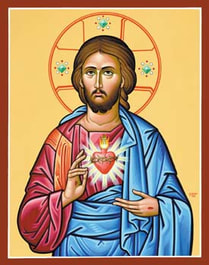 Whenever you think of Christianity, it is next to impossible to overlook the role and importance of love in the story of salvation. God’s love for us is one that is infinitely more enduring than any infatuation or passing attraction. It is one that gives and purifies, sacrifices and yields for the good of another -- again and again and again. God’s love is one that extends through, before, and beyond eternity and is ultimately expressed from Calvary to each and every person, fully, freely, and forever. The Church has dedicated the month of June to a reminder of the depth of God’s love: the devotion to the Sacred Heart of Jesus. In His Most Sacred Heart, we see how absolutely consumed with love God is for us — so much so that He was willing to bear those heinous wounds, false accusations and derisions, and even His death in order to grant salvation for all. Artistic depictions of the Sacred Heart remind us of the torment Christ endured on our behalf: the heart is wrapped in a crown of thorns, pierced, bleeding, and aflame with a cross rising from the tongues of fire. The visible wounds of Christ’s heart reveal His invisible love. Thus, devotion to the Sacred Heart is described as “devotion to the love of Jesus Christ in so far as this love is recalled and symbolically represented to us by His Heart of Flesh.” As creatures that have both soul and body, bodily representations of Christ’s love sometimes touch us in ways that words do not. The Sacred Heart teaches us that authentic love incurs great costs, but it also always gives life. Historically, devotion to the Sacred Heart is believed to have grown from another devotion to Jesus’ body: the Sacred Wounds of Christ from His Passion. Saint Bernard of Clairvaux said that the piercing of Christ’s side revealed His goodness and the charity of His heart for us: “How good and pleasant it is to dwell in the Heart of Jesus! Who is there who does not love a Heart so wounded? Who can refuse a return of love to a Heart so loving?” Other religious and saints, such as Francis of Assisi, have themselves exemplified closeness to the love poured out by Christ’s Five Wounds and Sacred Heart. The devotion as it is most commonly known today is said to have begun with the 1673 appearance of our Lord to St. Margaret Mary Alacoque, a French nun of the Order of the Visitation of Holy Mary. Over a series of visits, Our Lord revealed to St. Margaret Mary the importance of devotion to His Sacred Heart: "Behold the Heart which has so loved men that it has spared nothing, even to exhausting and consuming Itself, in order to testify Its love … But what I feel most keenly is that it is hearts which are consecrated to Me, that treat Me thus. Therefore, I ask of you that the Friday after the Octave of Corpus Christi be set apart for a special Feast to honor My Heart, by communicating on that day, and making reparation to It by a solemn act, in order to make amends for the indignities which It has received during the time It has been exposed on the altars. I promise you that My Heart shall expand Itself to shed in abundance the influence of Its Divine Love upon those who shall thus honor It, and cause It to be honored." In 1856, the Solemnity of the Sacred Heart was officially added to the liturgical calendar — the day before the Memorial of the Immaculate Heart of the Blessed Virgin Mary. The faithful have several options for honoring the Sacred Heart as requested by our Lord:
The Love that Christ continually showers on us should totally consume us. Christ’s death is an infinitely huge debt that we can never repay—but in His infinitely huge capacity to love and be merciful, all our Lord asks in return is our love. As we are invited to share in His Divine Love, we are called to let that love change us to become better disciples and better witnesses. Most of all, let us strive to become authors of great love stories, never ceasing to wonder at the incredible truth that the God of the Universe loves us! The Solemnity of the Most Sacred Heart is also the World Day of Prayer for the Sanctification of Priests. Please pray for the priests in your parish and any other priests who have touched your life! "I will give them a new heart, and put a new spirit within them." -Ezekiel 11:19 I hold my son Leo closely, rocking him back and forth in the quiet of the night. He throws his head back, pushes against me, and babbles to keep himself awake. As his mother, I must be patient and persistent. The fruit of my efforts results in his deep breathing, dangling arms, and heavy eyelids. Leo is now ten months old—crawling, pulling himself up, climbing. While he still looks to me for assurance and affirmation, he much prefers exploration to stillness. Not wanting to miss a thing about this big world, he wrestles with me as I put him down for naps and at bedtime. I often think as I sing to Leo and soothe him to sleep: This is how I am with God. I wrestle with him, pushing back, filling my life with distraction. I prefer my will—my way—to his own. I forget to rest in his stillness. In my graduate program, a professor once shared a particularly beautiful insight that still strikes me today. He said that if two human beings rest long enough on each other’s chests, their hearts sync up and beat in rhythm with one another. As a mother, this insight is especially poignant and beautiful to me—I think of my son’s heart slowing down and mine speeding up to embrace and beat as one. Then I apply this truth to God: have I allowed myself to rest in him? Do our hearts beat as one? The Gospels tell us that John, the Beloved Disciple, reclined on the chest (kolpos in Greek) of Christ at the Last Supper. Applying my professor’s insight to the Gospel, we can gather from this image that John’s heart beat in time with Christ’s, whose own heart beat perfectly with his Heavenly Father’s. As Christians, we are all called and invited to become the Beloved Disciple. This is not a privilege for a select few. Resting on the kolpos of Christ and allowing our hearts to beat in time with his gives our lives true meaning and fulfillment. As Pope Francis said, “The Heart of the Good Shepherd tells us that his love is limitless; it is never exhausted and it never gives up. There we see his infinite and boundless self-giving; there we find the source of that faithful and meek love which sets free and makes others free; there we constantly discover anew that Jesus loves us even to the end’ (Jn 13:1), without ever being imposing.” This intimacy with God, however, does not happen overnight. The Gospel does not say that John rested on the chest of Christ right after Jesus called him to discipleship on the Sea of Galilee. This intimacy was the fruit of years spent in the presence of Jesus. It is the fruit of a deep relationship with him—sitting at his feet, sharing meals, listening to his preaching, witnessing his miracles. We do not rest on the chest of a stranger. We are called, therefore, to grow in intimacy with God by opening our hearts to his. As the Catechism of the Catholic Church states, “It is the heart that prays. If our heart is far from God, the words of prayer are in vain.” Though Christ opens his heart to all of his children, we are called to build that intimacy with him, as John did, through prayer, stillness, the sacraments, and service. The famous quote of St. Augustine reminds us that our hearts are restless until they rest in God. And so we will not feel satisfied in this world until we have allowed ourselves to rest in the heart, on the kolpos, of Christ. “God’s heart calls to our hearts, “ Pope Benedict XVI observed in his homily on the Solemnity of the Sacred Heart of Jesus. When we allow ourselves to rest in the heart of Christ, he invites us “to come out of ourselves, to forsake our human certainties, to trust in him and, by following his example, to make ourselves a gift of unbounded love.” Our encounter with the heart of the Good Shepherd, therefore, is what strengthens us to go out in our respective vocations and live as missionary disciples. May we rest on the kolpos of Christ and experience his perfect charity so that we may become “gifts of unbounded love” to the world. As we deepen our intimacy with God, let us look to John’s childlike trust and ask for his intercession in order to become who we were created to be: beloved disciples. Questions for Reflection: Do certain things keep you from growing in your relationship with Christ? How might God be calling you to rest in him? For resources on prayer, please click here. As I was walking down the sidewalk to my residence hall, I glanced at my watch and realized I had a busy night ahead. I still had class until the evening, had to eat dinner, meet with a resident, prepare for next Monday’s program about how faith enriches our relationships, and study for two exams the next day. When I unlocked the door to my room, I realized I had about fifteen minutes until my next class. I thought to myself that it would be a good time to quiet myself and pray. I decided it would be easier, since I was rushed, to quickly recite a couple of prayers rather than expend the necessary effort to examine my day or truly open my heart to God, the Infinite Love. My principle concern at that moment was to check daily prayer off my to-do list. I felt rather empty for the rest of the day and struggled in my ministerial responsibilities. I lacked authentic prayer in my day and it took its toll. While authentic prayer can be hard, especially for those of us involved in ministry, authentic prayer empowers us to fulfill the mission Christ entrusted to us. Yet, what exactly is authentic prayer?
During a homily in the chapel of the Santa Marta residence in 2013, Pope Francis stressed that “the Lord tells us: 'the first task in life is this: prayer.' But not the prayer of words, like a parrot; but the prayer, the heart: gazing on the Lord, hearing the Lord, asking the Lord.” Pope Francis astutely observed that authentic prayer is integrally connected to the heart, the Sacred Heart of Christ, and our own hearts. When we engage in authentic prayer, we are opening our hearts to the transforming infinite love and mercy of Jesus Christ. We are being honest with God about the desires of our own heart. While authentic prayer is certainly beneficial for our own selves, being practitioners of authentic prayer also is a gift to the entire Church. Others notice God using us sinful creatures as His instruments. Our lives become signs that point towards the Kingdom of God. Yet, we must each reflect on how tempting it is to imitate a parrot in our prayer. How often do we recite prayers to cross them off of our to-do list, having little faith that the Lord will answer them? Asking God to open our own hearts to His infinite love combats this temptation. If I had taken the time to really open my heart to God, to be honest in my prayer and not dress it up, I would not have struggled with my ministerial responsibilities. When we become men and women of authentic prayer, Christ transforms our hearts after His own heart. Thus, we are empowered by the Holy Spirit to be humble heralds of the infinite love and mercy of Jesus Christ. For more resources on prayer, click here. This time of the New Evangelization in the Church is beautiful: all the faithful are called to spread the love of Christ to the hearts of modern men and women. While the term New Evangelization, though beautiful, has become almost overused, common jargon within the Church, we are called to the radical joy and love the New Evangelization promotes. The task seems lofty at first glance. With controversies of all sorts in society today, the charge to love like Christ is even greater. However, the Body of Christ has been in trying times throughout the ages, and it’s the ability of holy men and women to magnanimously love that makes a difference in society. Today, the Church celebrates a saint that is a perfect example for the faithful of living out the call of the New Evangelization: St. Philip Neri, the Apostle of Joy. St. Philip Neri, a radical saint of the 16th Century, was known for his humility, obscure and hilarious means of mortification, pastoral care, humor, and charm. The legend and stories of St. Philip Neri are plentiful and cannot all be spoken of in this short post, but his charity is worth mentioning for those who are attempting to live out the call of the New Evangelization. Philip was known to have a strong devotion to the Holy Spirit. At the age of 29, before the feast of Pentecost, Philip was praying for a special outpouring of the Holy Spirit when he saw a globe of fire enter his mouth, move down his chest, and travel to his heart. At that moment, Philip experienced an immense amount of joy, as if his heart had expanded. The saint had been filled with the love of God! Throughout the rest of his life, when Philip was ministering to people in the confessional, celebrating Mass, or performing acts of charity, his heart would violently palpitate. Oftentimes, Philip would embrace his penitents and hold them close to his chest. The faithful would receive an immense amount of consolation from the embrace and this practice became known as “the most effective way of being delivered from temptation.” St. Philip Neri was known as the Apostle of Joy because his aim was love, and the Holy Spirit, the Flame of Love, was the driver in his mission. Philip died at the age of 80, dedicating his entire life to mercy, love, and joy. The many stories that follow him affirm that claim. He was dedicated to the Sacrament of Confession and would be available for Confession at all hours. Dispensing the mercy of Christ, Philip spent his last day on this side of heaven hearing confessions from the people he served and loved. Those he ministered to claim they could not be sorrowful or depressed around Philip; he exuded a constant flow of Christ’s joy. During an evaluation to determine Philip’s cause of death, the examiner found Philip’s heart to be twice the size of an average heart, causing the ribs around the heart to break and curve out. The love of God had been made manifest physically within him. Today could you imagine a Church with followers whose hearts, like Philip’s, are enlarged with love for neighbor? This is the call of the New Evangelization—to spread Christ’s fragrance of love everywhere, “for we are the aroma of Christ” (2 Cor 2:15). The Church is in a unique time. Our intellectual arguments often mean little, but our actions and witness of love are powerful. The New Evangelization calls us to be little Apostles of Joy. Wherever we are and wherever we go, we are to love. Cardinal Ratzinger explained that evangelization is teaching people the path to happiness. “To evangelize means: to show this path—to teach the art of living,” he said (Address to Catechists and Religion Teachers, 12 December 2000). St. Philip Neri taught those around him the art of living a joyful, humble life, motivated by the love of Christ. To live the New Evangelization, we are to have a heart like his, witnessing and walking with others and teaching the art of living. The Body of Christ must be propelled by the love of God. Today, let us invite the Holy Spirit into our hearts in a deeper way so we might gain a greater capacity to love like our joyful friend, St. Philip Neri. May we be a people of love with enlarged hearts for Christ, spreading joy to all. “The love of God makes us do great things.” –St. Philip Neri For more resources on the New Evangelization, click here. “The month of June is singled out, in a particular way, for the devotion to the Sacred Heart of Jesus. To celebrate the Heart of Christ means to turn toward the profound center of the Person of the Savior, that center which the Bible identifies precisely as his Heart, seat of the love that has redeemed the world. If the human heart represents an unfathomable mystery that only God knows, how much more sublime is the heart of Jesus, in which the life of the Word itself beats. In it, as suggested by the beautiful Litanies of the Sacred Heart that echo the Scriptures, are found all the treasures of wisdom and science and all the fullness of divinity.”
-St. Pope John Paul II, on the Solemnity of the Most Sacred Heart of Jesus, June 24, 2002. Tomorrow, June 12th, is the Solemnity of the Most Sacred Heart of Jesus. There are many pious devotions to the Sacred Heart which are worthy of practice. Since it is impossible to do justice to them all in just five hundred words, just three of the 33 invocations from the Litany of the Sacred Heart of Jesus (which St. Pope John Paul II described as “beautiful”) will be the focus here. Don’t limit yourself to the brief snippets here! If you pray the Litany in its entirety, you might find an invocation which best speaks to your own prayer life. “Heart of Jesus, full of goodness and love, have mercy on us.” Can you think of a powerful example of love and goodness? Maybe you think of Mother Teresa and her care for the poorest of the poor. Maybe Saint Maximilian Kolbe, who was willing to die in the place of a stranger at Auschwitz so that the man’s children would still have their father comes to mind. There are many touching, beautiful examples of real love and compassion in the world. The love and goodness of Jesus surpasses them all; His love extends to us all, even when we fail to love Him in return. “Heart of Jesus, obedient to death, have mercy on us.” Jesus has a very difficult cross to bear. Before He picked up His cross (literally), He knelt praying in the garden of Gethsemane. Although He prayed that the task might be taken away from Him, in the same breath, He reconciled Himself to the Father’s will (Mt 26:39). Jesus followed the Father’s will because He loves each one of us. Each of us have much smaller crosses to carry; relatively few of us in the United States will be asked to give our lives for our faith. It is easy to grumble when difficulties come along; I myself, like most of us, often fall into that trap. Jesus resigned Himself to the Father’s will so that we might be saved. He wants to give us the graces we need to do the Father’s will, just like He did. “Heart of Jesus, source of all consolation, have mercy on us.” In your most sorrowful moments, where do you turn to for comfort? A close friend or family member? A beloved pet? Chocolate? In times of sadness, there are few things more comforting than a hug from someone you love. Jesus’ heart is overflowing with love for you and He is there with outstretched arms ready to wipe away your tears. You would be hard pressed to find a better listener or someone who loved you more than Him. The Solemnity of the Most Sacred Heart is also the World Day of Prayer for the Sanctification of Priests. If you have a few extra moments to spare tomorrow, remember to say a prayer for the priests in your parish and any other priests who have touched your life! Jennifer Beckmann is an Administrative Secretary for the United States Conference of Catholic Bishops. For more information on Prayer life, please see our Prayer and Catechesis Resource Page! We are about two weeks into our Lenten sojourn, and I’m not sure about your experience so far, but I know that it has already been a challenge for me. And that’s good! I wanted this Lent to more closely unite me to the Cross of Christ, not just for these forty days, but beyond this season, and God is answering this prayer in ways that I could never expect. In fact, he is delivering me from my own crosses so that I may know joy through this suffering.
So far, I’ve been able to take away two important lessons from my Lenten journey so far:
Life is hard. Our days are filled with many demands, and sometimes we fail to meet them. People will disappoint us. We may hurt others by our words or actions. We find ourselves exasperated, or at times feeling hopeless. But the one who hopes in the Lord knows that all of these trials of being human bring us to the Cross and teach us sacrificial love. This weekend at mass I was told, “Lent is a school of charity. Life is a school of charity” (Msgr. Andrew Wadsworth). As we navigate these crosses, God is literally stretching our hearts to be open to love – the love of the Cross – so that when we reach heaven, our hearts are like Christ’s sacred heart. And if he stretches our hearts through pain and sorrow, imagine how much God stretches our hearts through hope and joy! Through every trial and every gift we are being molded to become more Christ-like, capable of infinite love. If we could truly fathom this infinite love that God is preparing us for, we would live life on our knees in awe of the Cross. Truly we can say that life is a school of love, a school of charity. The readings today teach us how we can plant our roots to let the Lord more fully direct our lives. We are consistently given the image of a tree whose roots are planted near running water. This tree’s leaves never fade, and in even drought, it still bears fruit. For me, this tree represents my cross, whose confidence must rely solely in the Lord. God can only keep my leaves evergreen if I live off of his waters, God will perform miracles in my life if I let him. Truly letting go of my pride and independence is so hard, yet extremely humbling. It truly takes confidence and prayer. In this school of charity, I’ve learned that even the simplest of prayers can help me submit my cross to God each day: “Multiply my time, Lord,” or “Let me see you where you need me to.” When I say these prayers and trust God to fulfill them, he does. He’s stretching my heart to know his love. He carries my crosses for me. Truly, I am a mere student in this school of charity. As you pray today over your takeaways from Lent so far, I pray that you come to find peace in how the Lord is trying to carry your cross through His school of charity, and that you call upon the grace to let him do so. I pray that you reflect on where your tree is planted and that you want to live by God’s living streams. Ultimately, I pray that you know how loved you are. You are so loved that God is stretching your heart so that you may become more like him. He wants you to know infinite love, who is our Lord Jesus himself. “I pray that you, being rooted and firmly established in love, may be able to comprehend with all the saints what is the length and width, height and depth of God’s love.” – Ephesians 3:17-18 Alyce Anderson is a teacher in Washington, D.C. Tomorrow we celebrate the Solemnity of the Most Sacred Heart of Jesus. When we hear the name, “Most Sacred Heart of Jesus,” most of us probably think of a statue that appears in many of our churches.: the image where Jesus stands with his heart, burning with joy and love for us, exposed to all. Many of us probably do not think any deeper about this statue, and yet we are called to more. Pope Francis, in his 2013 homily on the Most Sacred Heart of Jesus, said, “It is more difficult to let God love us than to love Him! The best way to love Him in return is to open our hearts and let Him love us.” Every time we see these statues we are reminded to open ourselves to the love of Christ and give ourselves completely to him as he does. He lays his heart open before us as an example of how to live our lives.
The readings for the Solemnity also give us great insight into the importance of the Most Sacred Heart of Jesus and how we can relate it to our lives. The first reading comes from the Book of Deuteronomy, which means “second law.” The most striking part of this passage is where Moses says, “It was not because you are the largest of all nations that the Lord set his heart on you and chose you, for you are really the smallest of all nations. It was because the Lord loves you” (Dt 7:6-11). These words are not just a reminder of the covenant that the Lord made with Abraham, but a foreshadowing and reflection on the sacrifice of Christ on the cross. Christ literally lays down his life, sets down his heart for us, the insignificant people that we are. Why? Because he loves us. He gives us his whole self so that we, in some small way or another, might experience the love of God more fully. The heart on statues of the Most Sacred Heart of Jesus is exposed to show us that he is “sett[ing] his heart” on us, and it burns with his love for us. John, in his gospel passage 4: 7-16, expounds upon this idea of love and demonstrates for us how the covenant made between God and Abraham has been fulfilled in the Gospel. He explains to us that God is love and it is through our love for each other that we come to know God and serve him. John tells us about the importance of Christ’s sacrifice, “so that we might have life through him,” and while we have not seen God, he calls us to have faith: “No one has ever seen God. Yet, if we love one another, God remains in us, and his love is brought to perfection in us.” We are not led blindly into a community of faith, but rather we are given a simple rule, to love others as God loves us. By following this commandment we remain one with God. This is the message of the Most Sacred Heart of Jesus. This feast day reminds us that Jesus gave us the ultimate example of love, laying down one’s life for another, and thus he set his heart upon us. It is easy to forget the humanity of Christ, after all he is the Son of God, walked on water, and rose from the dead, and yet he bled for us. When the soldier pierced his side with a spear, out flowed blood and water. The Solemnity of the Most Sacred Heart of Jesus reminds us of Jesus’ humanity and the significance of his sacrifice. He suffered, he felt pain, he literally laid down his life and set his heart upon us. It is our turn to pick up what God has given us and share it with the world. Let us open our hearts and share Christ’s love. Nicholas Shields is a recent graduate of The Catholic University of America in Washington D.C. and Immediate Past Grand Knight of the CUA Knights of Columbus. |
Details
Archives
July 2024
Categories
All
|
About |
Media |
© COPYRIGHT 2024 | ALL RIGHTS RESERVED

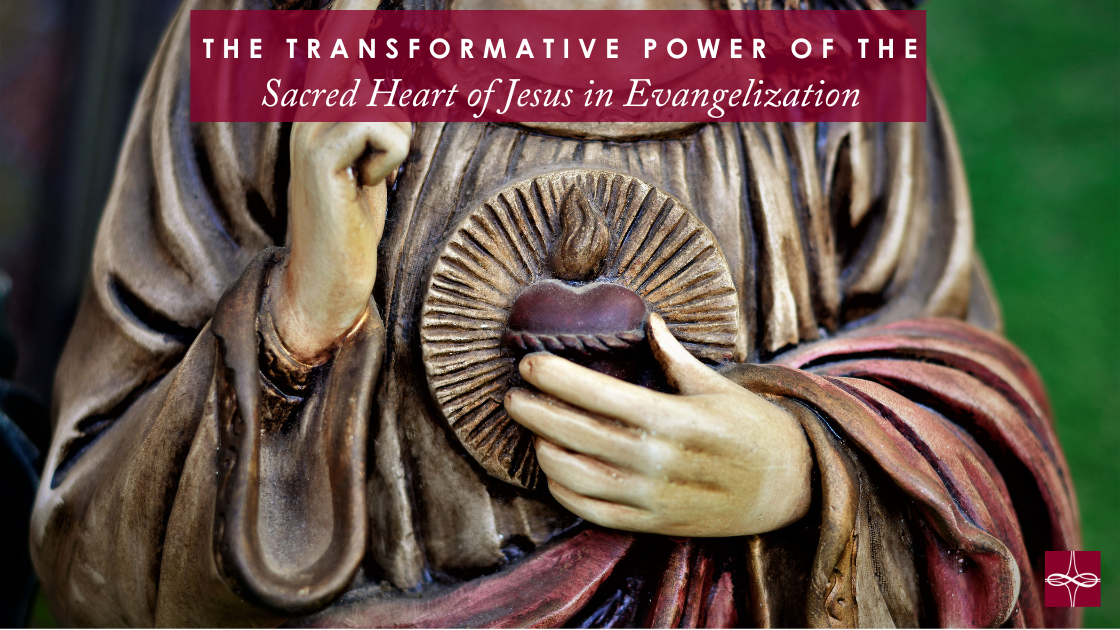

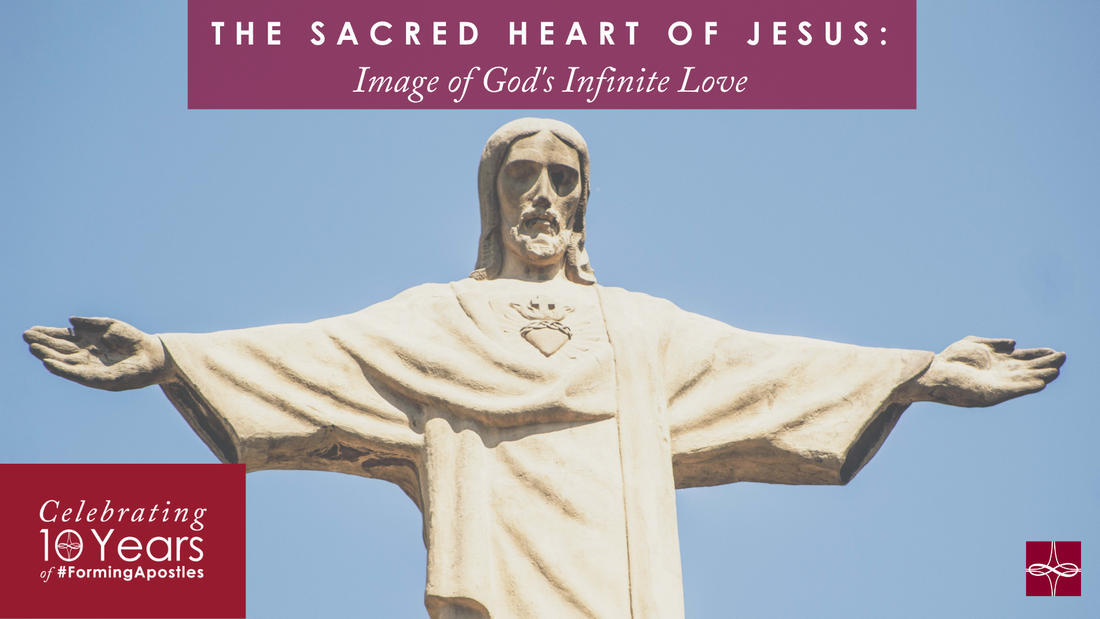

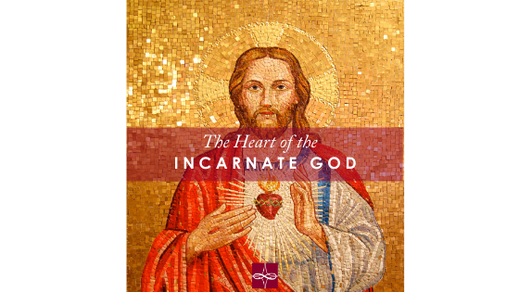

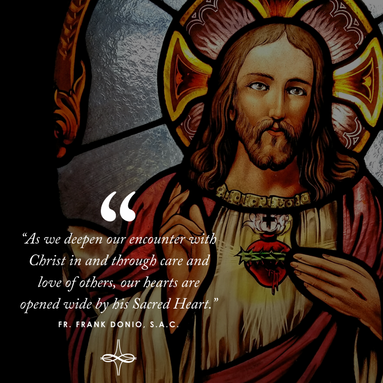
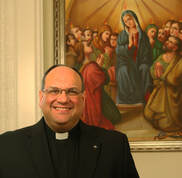
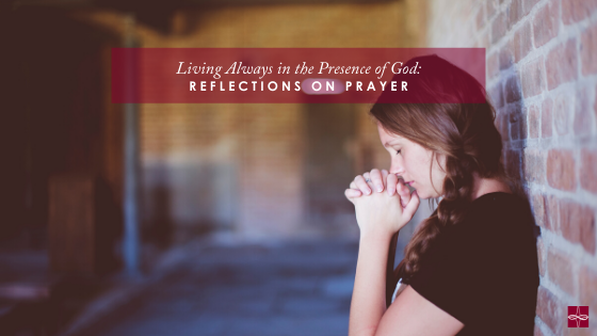

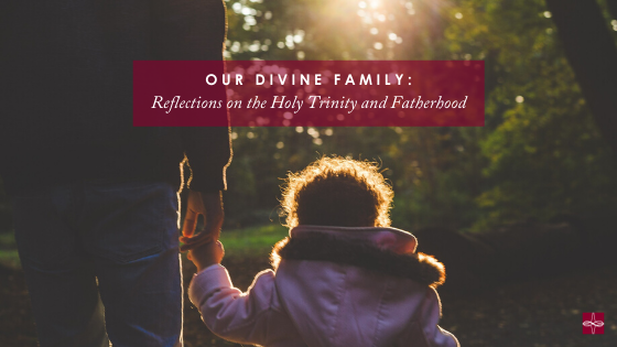




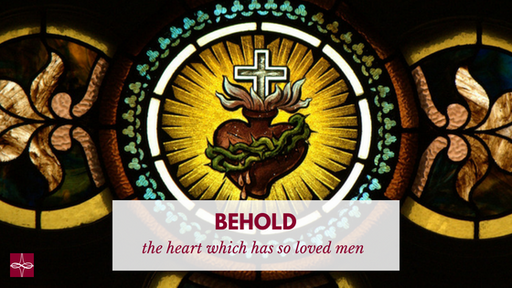

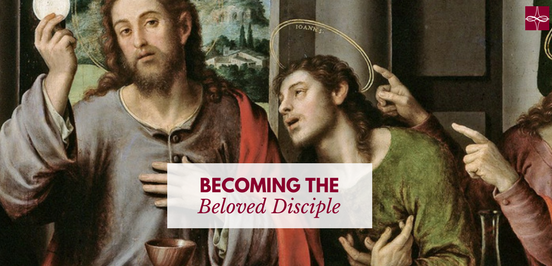

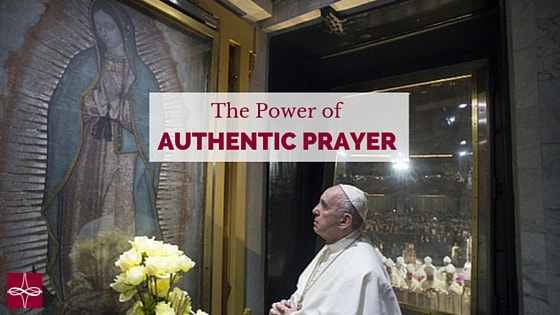

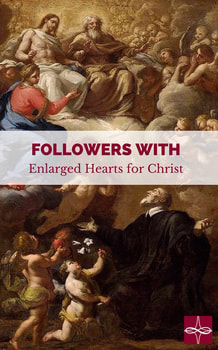




 RSS Feed
RSS Feed